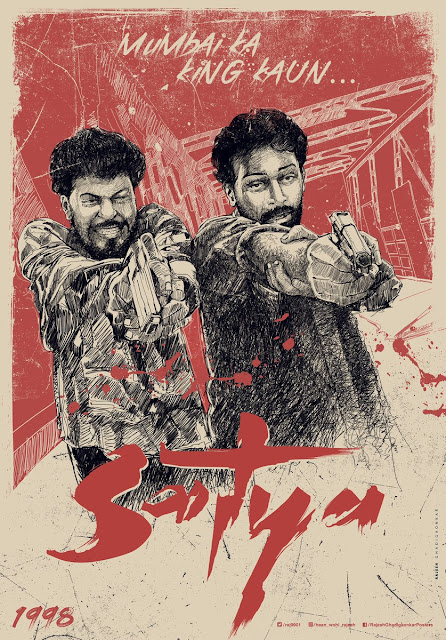Tracing the roots of "Mumbai noir" to Ram Gopal Varma's Satya (1998)
SATYA
by
Ram Gopal Varma
It is 1998. A man walks out of the Chatrapati Shivaji Terminus with a suitcase and walks into the streets of Mumbai like a million others who do it every day, in hopes of somehow making their ends meet. He has got no big plans and starts working at a pub, one where petty gangsters hang out. At that point, little does he know how his life is going to change as a result of this decision & by virtue of the code he lives by. Meet Satya, played by JD Chakravarthy, a pragmatic, calm, and mysterious immigrant who doesn’t believe in god. Meanwhile, a ‘supari’ killing goes awry compromising the identity of a hot-headed, impulsive gangster with a family, and infectious laughter, Bhiku Mhatre, forged in the streets of Bombay, played immaculately well by Manoj Bajpayee. They meet while serving their respective sentence in jail and quickly develop a bond. But Ram Gopal Varma’s Satya (1998) isn’t just about these two central characters or their ideologies, it is a much more ambitious and universal film. A gangster epic that still influences virtually every film set in the mean streets of Mumbai, a pioneering work of writing and "noir-esque" cinematography in India.
Varma is interested in examining the conflict that arises in a society that is filled with greed and is free of morality but is imposed on and governed by the set of rules which were established over the very principles that are disobeyed. What kind of people will that society breed? And how their inevitably doomed lives get affected forms the central point of the film.
The film opens with a voice-over that reasons that it was the economic disparity that acted as fertile soil for the origin of this underworld, in other words, all these unfortunate events are a side effect of the sheer existence of this society, in this particular form. Varma’s is a very practical take on the universe. There is an action, say an act of violence on one of the main characters; and it is only then that there is a reaction, an act of retaliation when there is a threat to their existence. At multiple points in the film, they’re reduced down to the basic instinct of survival and almost every act in the film traces back to either that or to the pursuit of a “better” life. But whatever their agendas are it is people on either side of the society, groups of people who are friends, ones who love each other despite their "anti-social activities". They are in fact unified due to this necessity of their's to resort to these so-called "anti-social activities" and accept each one another like any other group of friends.
Varma further humanises these characters by exploring their desires and ultimate goals in life. Like, for Satya it is to marry Vidya and have a normal life, he both literally and figuratively finds her in a dark & uncertain phase in his life before drowning completely into the world of Mumbai underbelly. And amidst all the chaos, while we start accepting the normally unacceptable actions, she acts as a reference for "normalcy", both for us as an audience and Satya who is caught in a dilemma between telling her the truth and concealing it in the fear of losing her. But for Bhiku, it is his affinity towards power and it actually traces back to the “survival instinct” we talked of before, after all, he is not as prudent or isn’t much of a thinker like Satya, as he is probably the result of a childhood that was sucked into this world as a result of his "conditions" or adolescence that lacked proper mentorship, guidance or education. Much of Bhiku's humanisation comes from the way Varma treats his family life and the way he depicts the brotherhood between him & Satya. Varma starts this with a short montage at the film beginning in the jail and continues throughout the film's run time.
Having said all that, the film does not turn a blind eye towards the "political correctness" of these actions, there are characters who stand at the other end of the spectrum. One of those is Commissioner Shukla, played by Paresh Rawal, who can be regarded as the antithesis of the collective whole of characters on the other side. He is well-read & sophisticated, his actions are surgical, and his understanding of the crisis Mumbai finds itself in is quite practical, non-judgemental, and to the point. He understands the role of his job and its shortcomings as a result of being bound to the very rules mentioned earlier. Shukla's point of view adds a whole new dimension to the entire setting and offers a new perspective while supporting the point made earlier in the film about the system giving rise to various strains of "anti-social".
It is impossible to watch Satya now and not experience some degree familiarity. Be it the groundbreaking cinematography, which uses the trademark Varma tracking shot where the Steadicam just chases the characters through the slums of Dharavi or the stylish & aesthetic side lighting; it's humanised anti-heroes; setting of the Bombay underbelly: a cruel & unforgiving place; the actors, for many of whom it was a debut.



Comments
Post a Comment